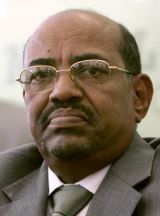Sudan will not accept UN force under any circumstance – Bashir
Sept 19, 2006 (UNITED NATIONS) — Sudan will not allow the United Nations to take control of peacekeepers in Darfur under any circumstance, its president said Tuesday, claiming that human rights groups have exaggerated the crisis there in a bid for more donations.
 President Omar al-Bashir did say that the African Union, which now runs the peacekeeping mission in Darfur, should be allowed to augment its forces with more logistics, advisers and other support.
President Omar al-Bashir did say that the African Union, which now runs the peacekeeping mission in Darfur, should be allowed to augment its forces with more logistics, advisers and other support.
“The picture that volunteer organizations try to give in order to solicit more assistance and more aid, have given a negative result,” al-Bashir told a news conference.
Speaking on the sidelines of the annual U.N. General Assembly debate, al-Bashir claimed that Zionist groups wanted to weaken Sudan and accused Israel of spreading a lie that Sudanese Arabs are killing Sudanese Africans.
“We refuse to normalize with Israel, we refuse to deal with Israel,” he said.
The fighting in Darfur has largely pitted Muslims against Muslims, though some identify themselves as African and others as Arab. The janjaweed, the Arab tribal militias unleashed by the government to suppress a rebellion by ethnic Africans, are accused of some of the worst atrocities.
The United Nations and many rights groups claim that the in Darfur has killed more than 200,000 people and displaced 2.5 million since 2003.
The underfunded AU force has been largely unable to stop the violence, leading AU leaders and the U.N. Security Council to demand a takeover by the United Nations, with its deeper pockets and better resources.
Al-Bashir reiterated his stance that the demands to put peacekeeping in Darfur under U.N. control are part of efforts to protect Israel, carve up Sudan and gain access to its oil reserves.
While he ruled out U.N. peacekeepers at any cost, he said he had no objection to the African Union force receiving logistical, military and communications support, as well as material and advisers.
In what could be an encouraging sign, he said the African Union forces should be allowed to remain in Sudan until the region sees peace at last.
“We want the African Union to remain in Darfur until peace is re-established in Sudan,” al-Bashir said.
Those comments suggest that the African Union will not face any resistance in renewing the peacekeeping force’s mandate, which expires on Sept. 30.
Last month, the Security Council passed a resolution that would put the peacekeepers under U.N. control, but required Sudan’s consent.
In his speech to the U.N. General Assembly earlier Tuesday, U.S. President George W. Bush repeated Washington’s belief that the Darfur tragedy is a genocide, and said the AU force is “not strong enough” to protect the people of Darfur. He called for the force to be strengthened and demanded the U.N. take control.
“If the Sudanese government does not approve this peacekeeping force quickly, the United Nations must act,” Bush said. “Your lives and the credibility of the United Nations is at stake.”
In that speech, Bush announced that he was naming Andrew Natsios, the former director of the U.S. Agency for International Development, as his special envoy for Sudan.
The United States and its allies are now weighing whether there are other options for confronting al-Bashir’s government, including the possibility of military intervention despite his objections to U.N.-controlled peacekeepers.
In her speech to the General Assembly, Liberian President Ellen Johnson Sirleaf said the stalemate over whether a U.N. or AU force should be deployed “demonstrates a lack of international will to address the sufferings and yearnings of the citizens and residents of Darfur.”
Saying the U.N.’s obligation to protect the helpless and innocent must remain paramount, she called on the Security Council to act under Chapter 7 of the U.N. Charter, which allows military intervention, “to restore peace, security and stability to Darfur.”
(AP/ST)
